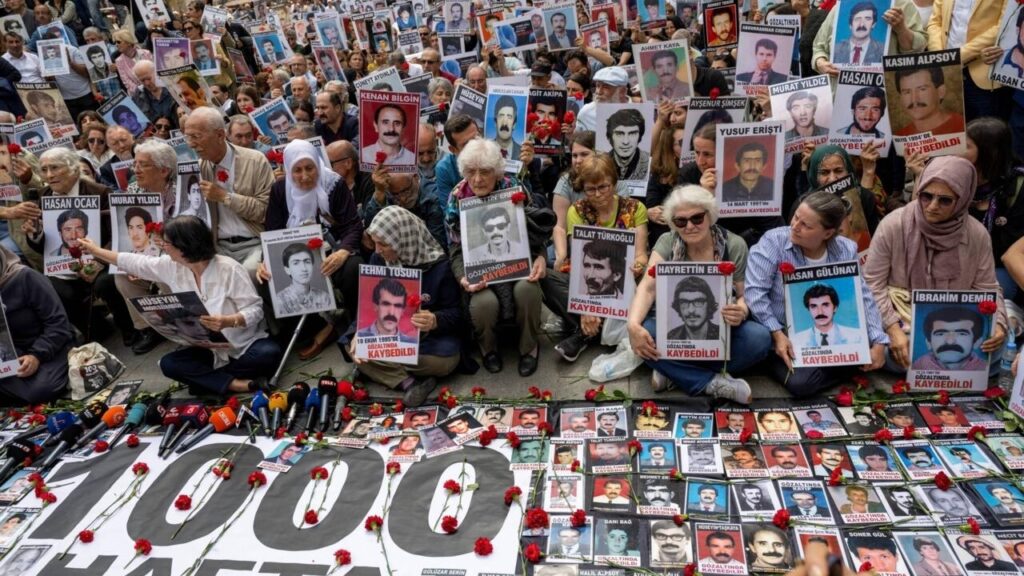Turkey’s longest running peaceful protest movement has reached its 1,000th week. For decades, the “Saturday Mothers” have been chanting in silent prayer for justice for relatives who disappeared while in security forces’ custody.
In Galatasaray Square in central Istanbul, a mother is crying out for justice for her child, who has been missing for decades after being arrested by police.
The Saturday Mothers, named after a similar movement in Argentina, have gathered in the square demanding explanations: They want to know what happened to their missing relatives and hold those responsible to account.
The exhibit features hundreds of photographs of people who went missing while in security forces’ custody, including the youngest, a 13-year-old shepherd boy named Davut.
denial
Iqbal Eren has been campaigning for decades to uncover the truth behind the enforced disappearance of his brother Hayrettin.
“Hayrettin Eren was detained at the Saracane checkpoint in Istanbul and taken to Gayrettepe police headquarters, where he disappeared,” Eren said.
“There are five witnesses who confirmed his detention but they always deny that he was in custody. We also saw his car parked on the security services’ premises.”
Ellen says even if another 44 years pass, she won’t give up on seeking justice for her brother or any of the other missing people.
Hayrettin disappeared under military rule in the 1980s, but most of the hundreds of enforced disappearances took place in the 1990s, during the escalation of the war between Turkey and the Kurdish rebel group PKK.
“Particularly in the early 1990s, mainly between 1992 and 1994, huge numbers of people, mainly men, were arrested and never seen again,” said Emma Sinclair Webb of Human Rights Watch.

Turkish family members hold up portraits during the 1,000th weekly vigil of the Saturday Mothers group, which commemorates victims who were “disappeared” in government custody in the late 1980s and 1990s, in front of Galatasaray High School in Istanbul on May 25, 2024. AFP – Yasin Akgul
Justice has escaped
Turkish President Recep Tayyip Erdogan promised justice after meeting with some of the Saturday Mothers when he was prime minister in 2011.
Criminal investigations and trials were also carried out against those allegedly behind the disappearances, but all ended in acquittals.
In recent years, the government has stepped up its crackdown on what it sees as subversive mothers’ protests: Galatasaray Square is now permanently closed off, with only around 10 people usually allowed in each week.
“The powers that be cannot stand the idea of these women and the families of the missing meeting every Saturday to confront the crimes committed by the state,” Sinclair Webb said.
“For many years, authorities have done everything in their power to criminalize this rally and those involved in it.”
The Saturday Mothers’ 1,000th week event in May saw an outpouring of support on social media and even a pop music video commemorating their struggle.
Rock star Teoman has recorded a song called “Saturday Mothers,” reflecting on his fight for justice in the face of threats and adversity, and the video for the song has gone viral on social media.
The fight continues
As the Saturday Mothers movement reaches its 1,000th week, the women have vowed to continue until justice is achieved for their fallen family members.
“We are trying to explain that the missing people are not abandoned, they are not orphans. We are trying to find out their fate,” said Bilsen Karakok, who has been searching for his brother Ridvan since the 1990s.
“We are trying to understand why they were tortured to death. We want justice. That’s why we’re here every week.”
“We’ve been here for 30 years since the first week and we’ll always be here.”
At the end of the 1000th week ceremony in Galatasaray Square, Birsen’s brother Hasan laid a flower at the sculpture celebrating the Republic of Turkey.
He called out to bystanders: “We will never give up until all those missing are found and those responsible are brought to justice.”


